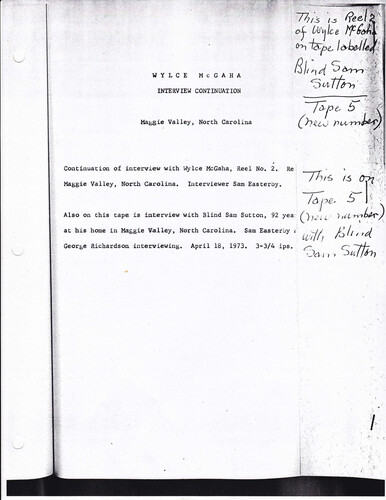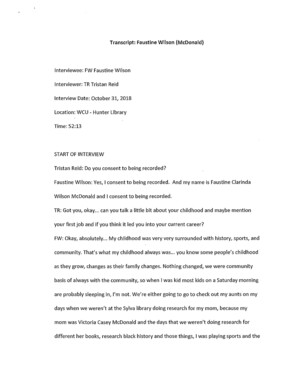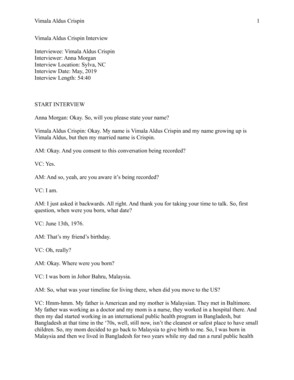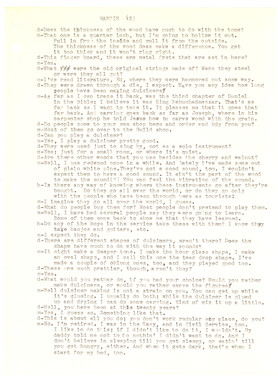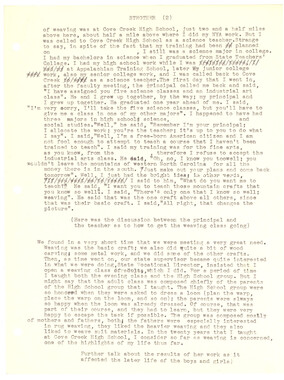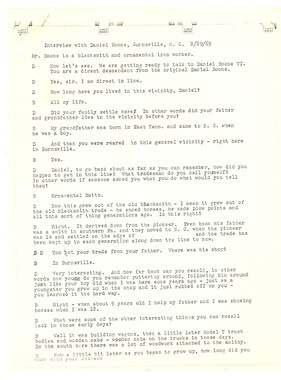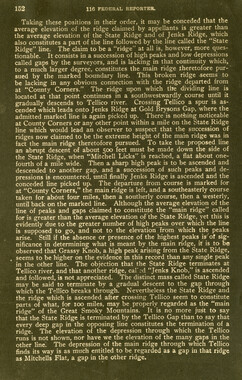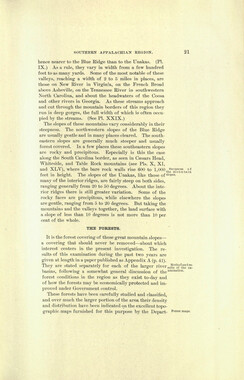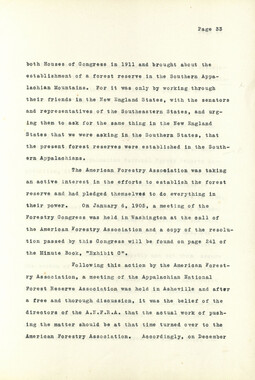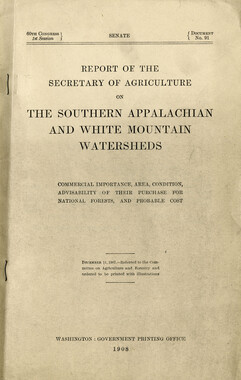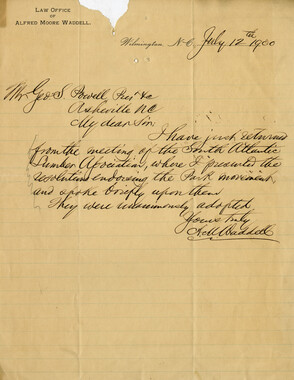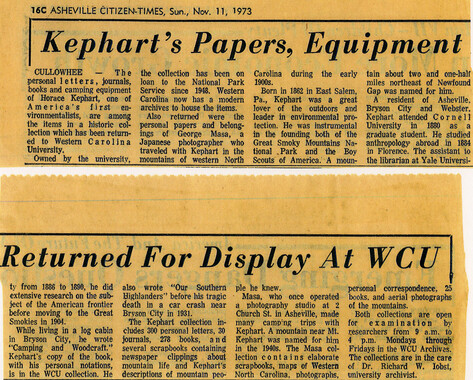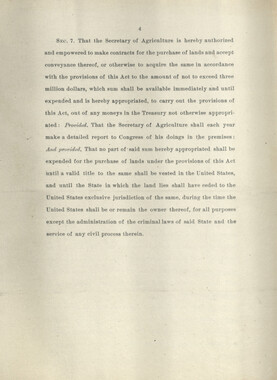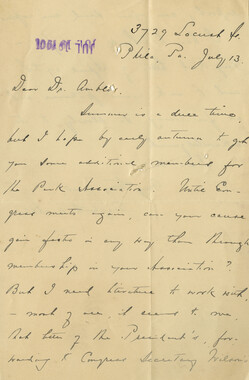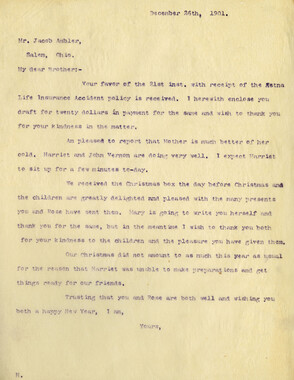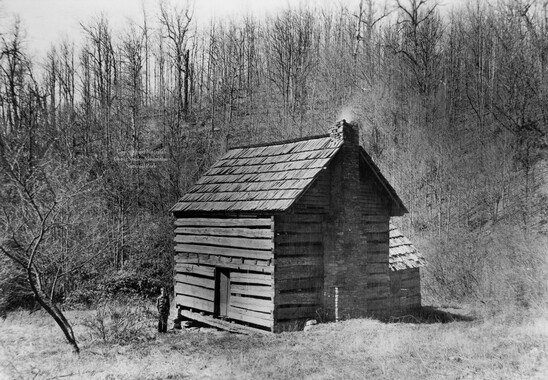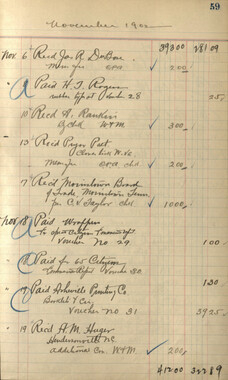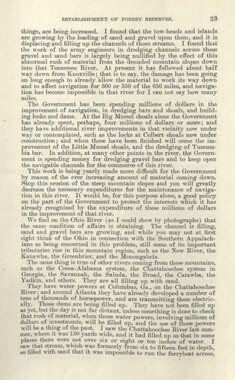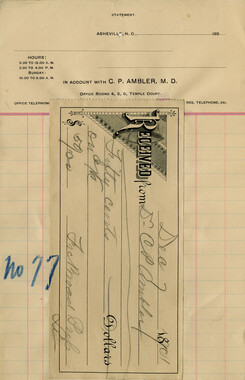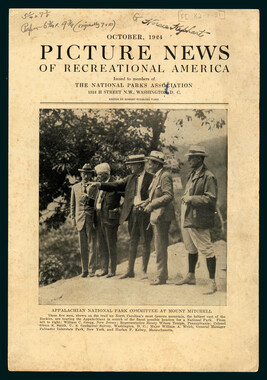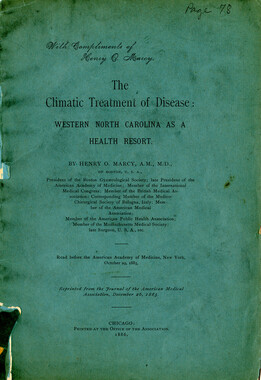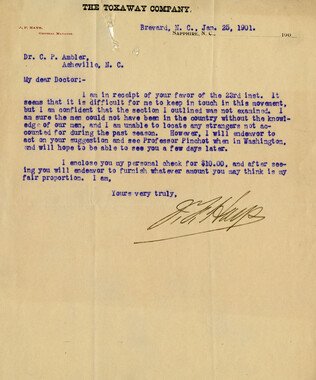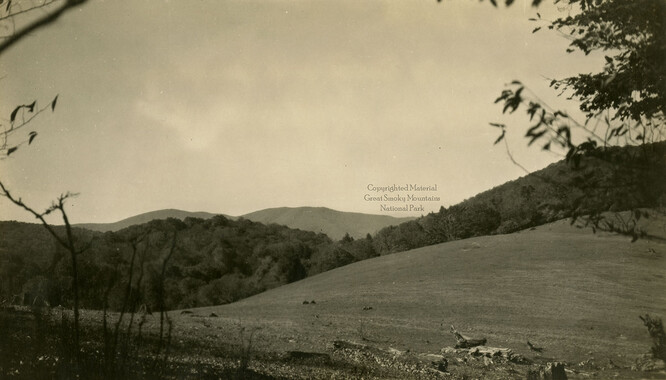Western Carolina University (20)
View all
- Canton Champion Fibre Company (2308)
- Cherokee Traditions (293)
- Civil War in Southern Appalachia (165)
- Craft Revival (1942)
- Great Smoky Mountains - A Park for America (2683)
- Highlights from Western Carolina University (430)
- Horace Kephart (941)
- Journeys Through Jackson (154)
- LGBTQIA+ Archive of Jackson County (15)
- Oral Histories of Western North Carolina (314)
- Picturing Appalachia (6679)
- Stories of Mountain Folk (413)
- Travel Western North Carolina (160)
- Western Carolina University Fine Art Museum Vitreograph Collection (129)
- Western Carolina University Herbarium (92)
- Western Carolina University: Making Memories (708)
- Western Carolina University Publications (2283)
- Western Carolina University Restricted Electronic Theses and Dissertations (146)
- Western North Carolina Regional Maps (71)
- World War II in Southern Appalachia (131)
University of North Carolina Asheville (6)
View all
- Allanstand Cottage Industries (62)
- Appalachian National Park Association (53)
- Bennett, Kelly, 1890-1974 (1295)
- Berry, Walter (76)
- Brasstown Carvers (40)
- Carver, George Washington, 1864?-1943 (26)
- Cathey, Joseph, 1803-1874 (1)
- Champion Fibre Company (233)
- Champion Paper and Fibre Company (297)
- Cherokee Indian Fair Association (16)
- Cherokee Language Program (22)
- Crowe, Amanda (40)
- Edmonston, Thomas Benton, 1842-1907 (7)
- Ensley, A. L. (Abraham Lincoln), 1865-1948 (275)
- Fromer, Irving Rhodes, 1913-1994 (70)
- George Butz (BFS 1907) (46)
- Goodrich, Frances Louisa (120)
- Grant, George Alexander, 1891-1964 (96)
- Heard, Marian Gladys (60)
- Kephart, Calvin, 1883-1969 (15)
- Kephart, Horace, 1862-1931 (313)
- Kephart, Laura, 1862-1954 (39)
- Laney, Gideon Thomas, 1889-1976 (439)
- Masa, George, 1881-1933 (61)
- McElhinney, William Julian, 1896-1953 (44)
- Niggli, Josephina, 1910-1983 (10)
- North Carolina Park Commission (105)
- Osborne, Kezia Stradley (9)
- Owens, Samuel Robert, 1918-1995 (11)
- Penland Weavers and Potters (36)
- Roberts, Vivienne (15)
- Roth, Albert, 1890-1974 (142)
- Schenck, Carl Alwin, 1868-1955 (1)
- Sherrill's Photography Studio (2565)
- Southern Highland Handicraft Guild (127)
- Southern Highlanders, Inc. (71)
- Stalcup, Jesse Bryson (46)
- Stearns, I. K. (213)
- Thompson, James Edward, 1880-1976 (226)
- United States. Indian Arts and Crafts Board (130)
- USFS (683)
- Vance, Zebulon Baird, 1830-1894 (1)
- Weaver, Zebulon, 1872-1948 (58)
- Western Carolina College (230)
- Western Carolina Teachers College (282)
- Western Carolina University (1794)
- Western Carolina University. Mountain Heritage Center (18)
- Whitman, Walt, 1819-1892 (10)
- Wilburn, Hiram Coleman, 1880-1967 (73)
- Williams, Isadora (3)
- Cain, Doreyl Ammons (0)
- Crittenden, Lorraine (0)
- Rhodes, Judy (0)
- Smith, Edward Clark (0)
- Appalachian Region, Southern (2393)
- Asheville (N.C.) (1886)
- Avery County (N.C.) (26)
- Blount County (Tenn.) (147)
- Buncombe County (N.C.) (1664)
- Cherokee County (N.C.) (283)
- Clay County (N.C.) (555)
- Graham County (N.C.) (233)
- Great Smoky Mountains National Park (N.C. and Tenn.) (478)
- Haywood County (N.C.) (3522)
- Henderson County (N.C.) (70)
- Jackson County (N.C.) (4692)
- Knox County (Tenn.) (21)
- Knoxville (Tenn.) (9)
- Lake Santeetlah (N.C.) (10)
- Macon County (N.C.) (420)
- Madison County (N.C.) (211)
- McDowell County (N.C.) (39)
- Mitchell County (N.C.) (132)
- Polk County (N.C.) (35)
- Qualla Boundary (981)
- Rutherford County (N.C.) (76)
- Swain County (N.C.) (2017)
- Transylvania County (N.C.) (247)
- Watauga County (N.C.) (12)
- Waynesville (N.C.) (68)
- Yancey County (N.C.) (72)
- Aerial Photographs (3)
- Aerial Views (60)
- Albums (books) (4)
- Articles (1)
- Artifacts (object Genre) (228)
- Biography (general Genre) (2)
- Cards (information Artifacts) (38)
- Clippings (information Artifacts) (191)
- Crafts (art Genres) (622)
- Depictions (visual Works) (21)
- Design Drawings (1)
- Drawings (visual Works) (184)
- Envelopes (73)
- Facsimiles (reproductions) (1)
- Fiction (general Genre) (4)
- Financial Records (12)
- Fliers (printed Matter) (67)
- Glass Plate Negatives (381)
- Guidebooks (2)
- Internegatives (10)
- Interviews (811)
- Land Surveys (102)
- Letters (correspondence) (1013)
- Manuscripts (documents) (619)
- Maps (documents) (159)
- Memorandums (25)
- Minutes (administrative Records) (59)
- Negatives (photographs) (5651)
- Newsletters (1285)
- Newspapers (2)
- Occupation Currency (1)
- Paintings (visual Works) (1)
- Pen And Ink Drawings (1)
- Periodicals (193)
- Personal Narratives (7)
- Photographs (12982)
- Plans (maps) (1)
- Poetry (5)
- Portraits (1654)
- Postcards (329)
- Programs (documents) (151)
- Publications (documents) (2237)
- Questionnaires (65)
- Scrapbooks (282)
- Sheet Music (1)
- Slides (photographs) (402)
- Sound Recordings (796)
- Specimens (92)
- Speeches (documents) (15)
- Tintypes (photographs) (8)
- Transcripts (322)
- Video Recordings (physical Artifacts) (23)
- Vitreographs (129)
- Text Messages (0)
- A.L. Ensley Collection (275)
- Appalachian Industrial School Records (7)
- Appalachian National Park Association Records (336)
- Axley-Meroney Collection (2)
- Bayard Wootten Photograph Collection (20)
- Bethel Rural Community Organization Collection (7)
- Blumer Collection (5)
- C.W. Slagle Collection (20)
- Canton Area Historical Museum (2110)
- Carlos C. Campbell Collection (198)
- Cataloochee History Project (65)
- Cherokee Studies Collection (4)
- Daisy Dame Photograph Album (5)
- Daniel Boone VI Collection (1)
- Doris Ulmann Photograph Collection (112)
- Elizabeth H. Lasley Collection (1)
- Elizabeth Woolworth Szold Fleharty Collection (4)
- Frank Fry Collection (95)
- George Masa Collection (173)
- Gideon Laney Collection (452)
- Hazel Scarborough Collection (2)
- Hiram C. Wilburn Papers (28)
- Historic Photographs Collection (236)
- Horace Kephart Collection (861)
- Humbard Collection (33)
- Hunter and Weaver Families Collection (1)
- I. D. Blumenthal Collection (4)
- Isadora Williams Collection (4)
- Jesse Bryson Stalcup Collection (47)
- Jim Thompson Collection (224)
- John B. Battle Collection (7)
- John C. Campbell Folk School Records (80)
- John Parris Collection (6)
- Judaculla Rock project (2)
- Kelly Bennett Collection (1314)
- Love Family Papers (11)
- Major Wiley Parris Civil War Letters (3)
- Map Collection (12)
- McFee-Misemer Civil War Letters (34)
- Mountain Heritage Center Collection (4)
- Norburn - Robertson - Thomson Families Collection (44)
- Pauline Hood Collection (7)
- Pre-Guild Collection (2)
- Qualla Arts and Crafts Mutual Collection (12)
- R.A. Romanes Collection (681)
- Rosser H. Taylor Collection (1)
- Samuel Robert Owens Collection (94)
- Sara Madison Collection (144)
- Sherrill Studio Photo Collection (2558)
- Smoky Mountains Hiking Club Collection (616)
- Stories of Mountain Folk - Radio Programs (374)
- The Reporter, Western Carolina University (510)
- Venoy and Elizabeth Reed Collection (16)
- WCU Gender and Sexuality Oral History Project (32)
- WCU Mountain Heritage Center Oral Histories (25)
- WCU Oral History Collection - Mountain People, Mountain Lives (71)
- WCU Students Newspapers Collection (1744)
- Western North Carolina Tomorrow Black Oral History Project (69)
- William Williams Stringfield Collection (2)
- Zebulon Weaver Collection (109)
- African Americans (388)
- Appalachian Trail (32)
- Artisans (521)
- Cherokee art (84)
- Cherokee artists -- North Carolina (10)
- Cherokee language (21)
- Cherokee pottery (101)
- Cherokee women (208)
- Church buildings (166)
- Civilian Conservation Corps (U.S.) (110)
- College student newspapers and periodicals (1830)
- Dams (94)
- Dance (1023)
- Education (222)
- Floods (60)
- Folk music (1015)
- Forced removal, 1813-1903 (2)
- Forest conservation (220)
- Forests and forestry (905)
- Gender nonconformity (4)
- Great Smoky Mountains National Park (N.C. and Tenn.) (154)
- Hunting (38)
- Landscape photography (10)
- Logging (103)
- Maps (84)
- Mines and mineral resources (8)
- North Carolina -- Maps (18)
- Paper industry (38)
- Postcards (255)
- Pottery (135)
- Railroad trains (69)
- Rural electrification -- North Carolina, Western (3)
- School integration -- Southern States (2)
- Segregation -- North Carolina, Western (5)
- Slavery (5)
- Sports (452)
- Storytelling (245)
- Waterfalls -- Great Smoky Mountains (N.C. and Tenn.) (66)
- Weaving -- Appalachian Region, Southern (280)
- Wood-carving -- Appalachian Region, Southern (328)
- World War, 1939-1945 (173)
Interview with Wylce McGaha about life in Cataloochee
Item
Item’s are ‘child’ level descriptions to ‘parent’ objects, (e.g. one page of a whole book).
-
-
WYLCE McGAHA INTERVIEW CONTINUATION Maggie Valley, North Carolina --r;fe~ { h -t1-0 n ~.--~,/}'I"J Continuation of interview with Wylce McGaha, Reel No. 2. Re Maggie Valley, North Carolina. Interviewer Sam Easterby. lS _;____. ·-- / / ~ L ~ -) · 1 (.Jf:>e~ -.J '/ Also on this tape is interview with Blind Sam Sutton, 92 yeao ( })21 u )od-~:~), at his home in Maggie Valley, North Carolina. Sam Easterby •' li)'l//j j:_j /1, ,d._, George Richardson interviewing. April 18, 1973. 3-3/4 ips. ~J('.}, J _ 1 7 Su~J ·, ,· ,.' •·r] -·.' . ' ) ft(.._ /e-5 5 ~ j ._:) "771is fra-nsc;1f1;o.., Cover:; ; rifa-rv,'e.w w'.'tA ISC;,J S&n. s.;:m, f'!Yl~· . • , , f3LV1- Thfe Corn b ~~s II..'~ u-,le,-v I<ZLV LU ;-H, :< "" r~rt- (CDn\;;-nL~lto IJ) w,fh w~ \ce_ Me G~a . vlylce McGaha {12 Page 1' ) _How did you all celebrate Christmas? Christmas was the bisgest day of the year. I mean really. And, uh, it was more of a sacred time for us. And-- I think, uh, with a very few small things there was more appreciation in them than, than all the gifts that people can give today. I really do. I think that Christmas is something that with all the biving the year around it doesn't have too much meaning today for people, really. Do you think so? I don't. I don't. It's the small things that count. I think, uh, a piece of candy and an orange and maybe a new pair of overhauls or a coat like you got on was really something to get for Christmas. People really appreciate it. I think Christmas is one of the most sacred and was appreciated more than any other, any other time of the year. Yeah. Easter was a big day because we always had plenty of eggs you know. '1-Te looked forward to coloring eggs and what we usually colored them with-- You see there \vasn' t many-- You couldn't 60 to the store and buy colorings for an egg with. And what we colored our eggs with was-- with bloodroot-- Go out in the woods you know and dig the roots. And walnuts. Take walnut hulls. And Huh. Boil these walnut hulls or put 'ern in water and you color your ebgs you know, and we'd-- We used to have a paper that people make flowers out of. I've heard of that. I believe they called it crepe paper. lfl1 huh. Is that right ': lfl1 huh. Crepe paper. Wylce McGaha ff2 Yeah. And they'd take that paper and put it in to color their eggs out of that, see. There was all And we'd have yellow and green, blue, red, purple. And then have a big Easter egg hunt? 0 H, yeah. That was the-- All the kids in the community would bring their eggs tosether and hide 'em and hunt 'em all day. (Chuckling) It wasn't just for one time, it was all day. (Laughing) It seems like when you did things, when you did things like that you did them on a much grander scale. They were, they required more time. You spent all day doing something like that. Oh yeah. We didn't, we didn't-- Didn't have those y&u spend half an hour. That's right. That's right. We usually spend th4~ day when we'd start something why it lasted the full day. That's right. Christmas or Easter. Thanksgiving was another day. I think a lot of cooking and going on, you know, that sort of thinb. Cakes and sweets, rather, was something that you [ Ot maybe onct or twict a year. You didn't have cake every, every other day, or maybe a cake any time you wanted a piece of cake you didn't 1;,et it. Maybe onct a year you EOt a cake. Now we eat a lot of pies like we had tonight. Uh huh. Family pie we call it. Blackberry, huckleberry, apple, peach. We had, we used to have what we called Indian peaches. You never heard of them I don't suppose ·; No, I don't think so. ,. · ~~ -... . :•:. \olylce Mc9aha 112 I don't know where they came from but they was red. All the way throu:.:,h. Ins ide and a 11. ~~e' d ca 11 them Indian peaches. And they was good. Pickled especially. Like pickled esgs ? You can pickle up peaches like that. A pickled peach. Uh huh. A red pickled peach. It just looks like a beet. Looks like a beet. That's great. What-- You know-- I wonder-- Cornmeal was one of the, like cornbread and mush and thinss like that, was one of the more or less a staple, wasn't it? Oh yeah. Now did, did you save stuff like, say biscuits for Sunday? Yeah. Or did, was it, did Uh, Well Did you have biscuits every day? Well now a lot of families eat cornbread three times a day. I mean back when I was a kid they was a lot of families that eat cornbread three times a day but there was some families eat it only twice a day. They'd have biscuits for breakfast. Now what we call li ~ht bread today, loaf of bread, why I remember my mother used to, used to save it. I mean maybe onct or twict a year. Home made. Once or twice a year. all tha t you'd-- Besides, say corn bread-- what was, what was breakfast like? Wylce McGaha Breakfast? Well. In might near all homes you'd have biscuits the ham meat that you wanted to eat. With anywhere from 15 to that all depends on the .families, size of family. And they 'em and put them in your plate like they do today, they fried them put them on a platter. and fill the platter, maybe 15 or 20 egLs, and they called the family to ·breakfast, and they'd have what we call gravy. I guess you know what I'm talkint about. Uh huh. Say gravy. We'd have biscuits and then a lot of times we'd have apple sauce. \.Je called it fruit. And we had plenty of butter and milk was usually what we'd drink for breakfast. I guess I was, I guess I was 15 years old the first time I ever drunk a cup of coffee. Or older. Maybe 1& years old. Before L ever drunk a cup of coffee. Then was breakfast the biggest meal of the day? Usually it was-- it t.zas a very bib meal. No. I guess dinner because usually for workin6 people, uh, they'd eat a bi t meal every day, every meal was a big meal for them. Plenty of meat. Now for supper and dinner you'd have beans and potatoes and meat. And you'd have a lot of shucky, what we called shucky beans. Dried beans. Especially in the wintertime we'd have potatoes, fried, fixed potatoes so many different ways you know they'd have them in all ways. Sounds like-- you'd put on a lot of wei6ht eatin0 like that. Yeah • . :r; ivork it off. At meal times everybbdy was expected to be there on time? Wylce McGaha f/2 Oh yeah. Uh huh. Everybody'd sit down at the same time and eat , they didn't eat one at a time. Everybody set down at the table same time and eat. I remember the way they used to call us for We lived in a-- well~ lived in this house here. breakfast ready they'd just hit the wall, just like this you know, was your dinner call, the~ hit the wall and in every room in you could hear that just as plain as they'd beating right on, against the side of your head you know. So when you heard that knock you knowed ) it was time to come to breakfast. About what time did you-- would you usually get up around dawn, or I mean were you already up when breakfast was being fixed or were you-- No. Usually whenever you heard that by the time you get up and get your clothes on and get to the table it was being set 'cause the reason they did that was they wanted everything hot. Yeah. Your biscuits was hot. your meat was hot, your applesauce was hot, and your eggs would be hot. And everybody would have been-- From the time you bot the knock on the wall I'd say that within six minutes at the lon ~est everybody'd be a settin6 at the table. About six, that's what it amounted to because if you wasn't there why it'd be cold. You remember» you remember the t races you said at the table? Didn't have any. The first, huh. I'll tell you in a minute now. The first preacher I ever heard preach in my life I was 21 years old. The first prayer that I ever prayed in my life I was saved. And I never read a verse of scripture out of the Bible in my life til I was 21 years old. Wylce McGaha 112 Huh. Well, huh. Did you all have a family Bible? Yeah. Now my grandmother she would read the Bible. But don't know why. l-ie just never was accustomed to it I guess. I don't remember of anybody that would have a prayer before they bed what was called family altar. They was old people I've about the family altar now. We didn't have that. And we didn't say grace at the table. Or anythinL of that nature. Well what, what was the family altar like that they talked about? What was that? \.Jell. From what I can learn about it, it was before they'd go to bed at ni[;ht they would r:,ather the whole family, every one of them and come up and they would read the Bible and they would have prayer and discuss what they'd read, and then they'd so to bed. That's about what it amounted to. Pray you know. That's interesting that they'd discuss what they read. Uh huh. Yea~. They would all talk about it, anybody that would have a question, they'd let everybody, everybody'd have a part in it just like say you ::.o into a prayer meetin6 or somethinG now see. Everybody had a part. I~ Llf+l e. You said that most of the people moved ~a . Cataloochee were Baptists? Uh huh. Now was that, was that Southern Baptists or was that-- Yeah. That's Southern. Same thinh we've got now, I mean just about the same. MissionazyBaptist is about what it amounted to. That's, that's what you have on Bi6 Creek and Catalooch. ~11 those people in that country. Was-:- Now they's some Methodist on Bii; Ga Lalooch. I believe it's Palmers Chapel. Is that rit;ht'? Wylce McGaha #2 -··, , Uh huh. That's ri bht. I think the Little Cataloochee is much prettier than Palmer Chapel. Uh huh. Yeah. Of course, you've seen Palmers Chapel? How the door faces the Well, now, the old road used to be back there. Yeah. You see it looks funny. You're drivinb down the new road and here's this church facins the creek. Yeah. But the road used to go ri t ht in front of it. Right about where those tables are now. I can remember when that was the only road there was. This other road wasn't there see. You could have told me when I was a kid that they would be a paved road on Cataloochee and why I would have believed that New York City 'd been in Waynesville, moved it up there as quick as I'd believe a paved road would be on Cataloochee. I'd never believed that. When I was a kid. I just wouldn't even Say, have you heard about New York and Waynesville! (Laughter) There's a paved road. That's that. It's just almost unbelievable to see it. Yes, sir, it sure is. Well, I ' ll tell you what. Let me get on back, 'cause I've got to 50 back and finish timing some slides. You're tyin ~ some fl i es, fish flies ? No. Put toLether a slide program. Oh. That's somethin ~ I want to learn. Do ~ou know how to tie flies. Oh yeah. I used to tie my own flies whenever I'd bo fishin~ I'd just set down right on a bi 0 rock and tie my flies. You know what I tied it of? ...--- ---·-· -·· - . , J. ; · _r· . \'ly lee McGaha Huh uh. Well, the only thin ~ that we had to tie flies was a tobaccob ag, . string you know the oil strinb that's in this tobacco bat ? Unravel it 1 Unravel i t and a gray hackle fly. I mean you know, bray hackle out of a-- j ust pick up an old dominecker rooster and pull a feather out of it, take that tobacco bag and tie you a fly. I'd like to ~~hat. I really would. Don't know if I can do it. Fingers aren't nimble enouLh I guess. to l 1 v~ It's interesting I mean .~ike that, it really is. I get homesick for that so often that type of livinL• Yeah. I used to walk from Cataloochee to Big creek in nothing flat as you say, boy, I enjoyed that. I could, I could-- pretty 500d fellow stay with me in the mountai~ when I was a boy. I could travel. Coon hunts, fish. We used to do a lot of coon huntint over there, you know night. Uh huh. Everybody over there had doe.s, had coon do::-s. Did they have the Plott doLs then or was that before Plott dOLS No. That's what we had was Plott. Plott hounds ? Uh huh. Plott hound, Now what's that? 0 12. '9 ,.~ J.r It's a breed of hounds ~t I believe W4£ h~ed down here in the valley didn't it? Yeah. Ri~;;,ht here, ri ght here, this is Plott farm where we live now. Right now is old Plott farm. And they had a breed of dogs that was a brindle lookin ~ , you~ve seen the little brindle bulldos s ? . ;:• ' ':t"::'!:'"'· ·~:~q·~.!!(:"·'~f"'!:'!!'~-' ....... ~-.·~,;·'"1'!f. , - --~--- . Wy lee McGaha if2 ' Page 9 Uh huh. Same color as that, I mean the brindle part of it. These dol s was that color. They was wha t you call a Plott hound. How about that! It ori0inated right in here. Oh yeah. That's right. Ri ght here where we're at now. That's where that do0-- Old t entlernan . lived about, oh, half a mile on up the road here. He died. What did he breed it with? To make the Plott hound breed, do you know? Really I don't know. I don't know. I think it must have, where it tot that brindle must have come in from the cur you know, the cur was always a brindle looking do:_, like that. And once in a while you'd [;et a what we call a fantail. Out of the breed, have a bushy tail like a, like a, almost like a German police or something like that you know. And they was, oh boy, they was a vicious dot . Plott hound '? ) Ummh. Man. They was somethin ~ . One man dog? No. Uh. They was a-- a-- well we had one that was the best do ~ I ever saw. Ever had any dealings with. And it would do anythin ~ in the world that you wanted it to do. It-- you could take it a coon huntin~ or hit'd go fox hunting. My mother I've seen her go out to feed the chickens you know and j ust say, well just say she wanted to ca tch a chicken, she'd ' just point at that chicken and that do ~ would run that one hen to maybe 50 or 7S chickens and when it LOt iJ11d J Vdr- lc.vz to it ~e i ts feet on it, hold it down til she LOt to it. I mean it was j ust a family dog. It was a watch do::_ , it was a play do~, you'd s o out and play with him all day lonL, I mean >; -~:-t: : ": ~ ~··::~~.~~~~"~.~jt ~ Wy lee ~ McGaha 112 Page' :10 he'd play with you just like, play ball with you or anythinb. And then when you wanted to bO huntinL he was ready to 60 huntint. And he usually knew what you was boin& out for. You went out for coon he'd tree you a coon. You went out to fox hunt he'd lay a fox. He, he was just that way. I mean he was really a hood one. a...-PLoj..--.J.. Would he ~e ottt ~d fi ght a bear? Oh yeah. A good bear dog. Yeah,them dogs we had to fibht a bear. I've knowed 'em to t,o off and stay five and six days before they'd come in. They'd go off lookinb pretty tood, come back, well they was pitiful to look at. I guess, I guess most of the dogs had-- There weren't many vets up in here to they had worms and everything. Or did you have a way of worming them. No. We'd usually had a way of worming them you know, you'd-- Uh. Well for an example they had certain kind of medicine. If one 60t what they call distemper, you know what that is, distemper? Uh huh. What they done for 'em back then if one ~at that why just stick their feet in turpentine. That would do it. Uh huh. How about that! Yeah. That cured distemper, just stickinb their feet in turpentine? Yeah. Uh huh. Never knowed it to fail. Did you have a way of t etting rid of man5e? Oh yeah. · Wy lee McGaha 4/2 Page .11 Did you just cover them with tar or somethint, like that? No. You'd take and put a little oil on 'em, any kind of oil. What actually what the mange is just a dry, what you'd call a dry scalp or something like that. You know I mean, just irritates. You can put a little bit of oil and stuff like that on 'em. Mix sulphur and motor oil and put on them to cure 'em. Uh huh. Yeah. I didn't mean to say tar , I meant motor oil because I had some-- had a friend down at school that had an Irish setter that ~ ot mange. A beautiful do&. And he put, he put somethinL on it. It Lost about half its hair. Yeah. A bald Irish setter /167/ Uh huh. Peculiar looking dog. Give them a lot of grease sometimes, dobs7 Did you feed them a lot of 5rease? Yeah. Uh huh. Lard and stuff? Yeah. Feed 'em a lot of that. Now what we usually done to keep 'em from having man~ or anythint like that, uh, you know, uh, cottonseed hulls. People used to feed the cow you know just for /170/ not Let any strenhth but you let doLs sleep in there and they'll never have a manhe. And all those type of things I mean. Keep all that manLe and stuff off of 'em. They'll stay as healthy lookin6 as anythin0 you ever saw. How do you think those thins s develope~, say puttin~ the front feet, puttinL all four feet in the turpentine or just We usually just put the front. ) · ,~or~ · · \-lylce McGaha #2 Front feet ·? Uh huh. How, how do you think that developed ? ·) ·· ·' ~:· . Page 12 I really don't know. Now I've seen my mother do this. And I don't know why she did it, I never see anybody do it any more but, and I really don't know what she done it for. But she would take and hold a spoonful, tablespoon full, of turpentine to a cow's napel and you can stick that turpentine around. it's gone just the same as if you'd drink it. It's gone to the napel see, and why they done that I don't know, and then I seen, people used to take and split a cow's tail. They call it holler tail ' . They'd split that cow 1s tail and let it bleed out. And if they stayed that way you couldn't fatten 'ern. They'd just get sick and, you know, wouldn't do any good. All the feed you'd E,ive 'ern they'd never gain no weight even in summertime. Plenty of grass and stuff, cow wouldn't gain no wei tht til you spl~t her tail. It was what they called holler tail. And then they had what you call holler head. And-- I don't know what they did for that, I've forgotten. Split that open? But, and, I don't know what, my mother used to give a cow that turpentine for. But if you ever let a cow smell that turpentine you'll not do that. That's one th i n!:. that they can't, they can't stand is turpentine. -t-h 1n E Sam h? C nht>nd I l:lnderstaa.d: you r;..e meat:i:on a while ago. They didn't · have any . veterinarians or anything like that. Page 13, Oh no. Nuh uh. Everybody just done their own? Done their own. Maybe you had one old man or somethin2, that knew more about it, a little more about it than anybody else. If you got a cow sick. Now horse would have what they call "botts" you know. That's a worm that :::,ets in their stomach, and if they :::et down why if you see one you'd think it was going to die right then, but they'd drench 'em with, uh, molasses I believe it is. Put that down their stomach ·and whenever the worms get that sweet, why th~ they turn loose, see. They come on out then. Yeah. Uh huh. I wonder-- I wonder how customs like that develop now. Was it trial by error? Now I mean-- but-- how did you develop usint turpentine for the dot>? Well I don't know. I mean-- I guess it, more or less like, it's just a be~inning of what we think a study of a doctor would be today don't you 6Uess. I mean somebody just, uh, keep tryint something til he finds somethinb that works, don't .you suess. I ima6ine that's the way it 1 d be. I know, they used to. Do a lot of different thint;,s for flu : and fever and put a lot of poultices on you you know, if you 60t hurt, and I remember I had the earache one time whenever I was just a little kid. Never had it but the one time in my life like that I don 1 t think out, I remember my mother took ashes out of the fireplace, and put 'em in a ba0 , and poured warm water on them ashes in this ba~, and I laid my head on it and it eased my earache. Yeah. Wylce McGaha ff2 What did you do about pulling a tooth now, toothache? t=. YJU o+ s, o(. 1 d CosJ PJ/r J -s , 1;1 ( c).. 6J Qa r J _p.l- ff 3 Oh, there was one old t,entleman over there in (lau~;hing) they he'd drink about a quart and 60 and sit down and then he'd pull That way he got rid of that. What did he pull it with'? Pliers or something like that? No, he had a set of tooth pullers? Did he? Uh huh. Yeah. Yeah. Uh. They didn't take any shots or anythinL like that. And, ah, if a baby was born they didn't, they had it right in the home, I mean they wasn't no boinb to the hospital. My mother had one kid in the hospital is the only one out of the whole family that was born. They was 11 of us. And they was one born in a hospital. The rest of us !-hot e. was born at horne. When I was born there wasn't nobody~but me and her. Now didn't they usually have what a, they called a granny woman? Yeah. Yeah. They had what they call a &ranny woman. Female voice. /206/ Did what? Female voice: I bet you told 'em about everythint in the world. Hah. Hah. a, l uJ /207/ \-le talked about a-ll of .'em. I'd like to meet Sam Sutton. ~.Jell Sometime If you'll- - you'll come any time and I'll go down there with you. We'll go down any time. How about, what you think early next week sometime? Yeah, Monday or Tuesday evening~ From index number 210 to the end of.th interview at 217 is road directions, wi .·. considerable interference and doublin.&'~ ·..· . . We just turn oy the-- what's the name road by the By the country club road is Golf Course Road. the name of this road here? This is Old Soco Gap Road~ How is it marked down there? Is it marked good? Yeah, yeah, when we drive out. I just happened to remember Now if you're coming, from Gatlinburg, if you're comin& the mountain into the valley this way probably miss this turn off up here. He could, he could turn off up here if he'd. You know where the bi~ rock hotel is? On the left? I'm not sure. Female voice: He's about talked you to death. You know where the Maggie Valley Country Store i.~?
Object
Object’s are ‘parent’ level descriptions to ‘children’ items, (e.g. a book with pages).
-
This 93-page manuscript is titled “Interview with Wylce McGaha.” The 1973 interview is recalls life in Cataloochee. The history was collected as part of the Cataloochee History Project that collected photographs, stories, and oral histories about families who lived in the Cataloochee Valley. Today’s Cataloochee Valley is within the Great Smoky Mountains National Park. While, in general, the Great Smoky Mountains region was sparsely populated, the Cataloochee Valley remained an exception. By 1900, the population of Cataloochee had grown to 1,000 residents living in hundreds of log and frame homes.
-
